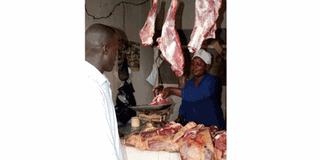Prime
Market Prices: Meat prices to go up with the new budget

A butcher measures beef for a customer. While the curent price of beef is high, traders believe it will go even higher once the taxes proposed in this year’s budget are implemented. Photo by Faiswal Kasirye.
What you need to know:
If some of the taxes proposed in this year’s budget are implemented, butchers are likely to increase the price of beef to make ends meet.
Beef prices will go up starting July 1, following the implementation of the 2012/13 national budget.
Deogratius Muwonge, a butcher at the Mini Butchery, Kabalagala, says the proposed increase of taxes of different items on the budget affects the beef in one way or another. He says they will have no choice but to increase the prices too because farmers will increase prices for their cows.
Depending on where you are buying from, a kilogramme of meat currently costs Shs8,000-Shs10,000. Dennis Mutegyeki, in St Balikuddembe Market (Owino) says the prices are likely to increase by Shs1,000- Shs2,000. This means a kilogramme will cost Shs9,000- Shs12,000.
At the beginning of last year, prices shot up from Shs4,000 and Shs4,500 to Shs5,000. And they kept on rising steadily almost every week to the current prices.
A kilo of beef at wholesale goes for Shs5,000- Shs5,500 which, Muwonge says, depends on where one is buying it. Muwonge defends the Shs3,000 and Shs5,000 that is added onto the kilo that is sold to the last customer, saying the butcher usually looks at the losses that he has incurred when buying and transporting the beef.
“When you look at it, that money that we add for a profit is really little money because we also have to pay rent for the places that we operate,” he says.
Last year, the increase in the prices was attributed to the scarcity of beef when the dry season did not leave pasture and water for the cows to feed; therefore many would end up dying. The increase in fuel prices was also a cause for the increased beef prices.
There is also the seasonal increase for example, during the Easter and Christmas seasons. During this period, Mutegyeki says no matter how high the prices are, people will always buy the beef. He says, “In Africa, a celebration without beef is not a celebration. People always save money for this period; so, no matter how much the beef costs, at least one will buy a kilo.”
Traders say beef has a good market; however, there are times and days when there is little market for it. “We don’t have customers during the week from Monday to Thursday. We start getting customers on Friday through Sunday,” Muwonge explains, “in the middle of the month say from the 15th to the salary pay day, there aren’t many customers.” During the lent seasons, the market goes down- “because the Catholics fast beef while during Ramadhan, Muslims prefer offals to beef.”
Because there are a few customers in such periods, there are leftovers, which traders keep in deep freezers, to keep it fresh.
Quality control
Before beef goes to the market, the authority in charge of a particular region, in Kampala’s case Kampala Capital City Authority, commissions veterinary doctors to check if it is good for consumption and it is then stamped for approval. However, what they don’t check for is how hard or soft the beef is. How do you then tell that the beef is hard or soft?
“It’s very simple. You can tell good beef from bad beef by looking at the bones. The bones of the old, hard beef are cream whereas the bones of young, soft beef tend to be whitish,” Muwonge explains.
The western region, especially Ankole, still remains the biggest suppliers of beef in the market.




